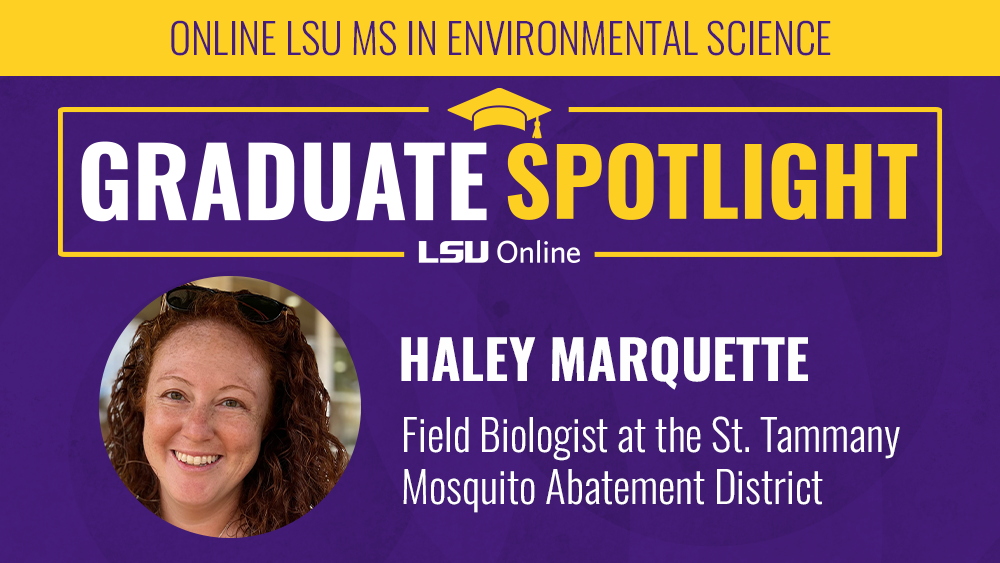Balancing a full-time career and pursuing higher education can be a tough feat. Still, Haley Marquette, a field biologist at the St. Tammany Mosquito Abatement District, managed to do just that. As a recent graduate of the online Master of Science in Environmental Sciences from LSU, Haley's experience shows how education can empower professionals to continue advancing their careers while contributing to real-world solutions. Her story also sheds light on how LSU's online program shapes the next generation of environmentalists.
Meet Haley Marquette
How did you balance life, work, and studies?
Balancing life, work, and studies was definitely tough, but I managed by staying organized and setting priorities. While working as a field biologist at the St. Tammany Mosquito Abatement District, I made sure to block off specific times for my classes and assignments to help myself keep up with my job responsibilities. I also always tried to leave room for personal time, which helped me avoid burnout and stay on track with my studies and career goals.
Can you share a specific example of how you applied what you learned?
A great example would be applying my environmental science knowledge to make our operations more sustainable at the Mosquito Abatement District. For instance, by understanding ecological interactions, I've helped support decision-making that aligns with sustainability goals, such as reducing chemical usage where possible or selecting control methods that are less disruptive to local ecosystems. While I don't develop strategies myself, my background has helped me contribute valuable insights that promote environmentally responsible practices in our day-to-day operations.
How did the program prepare you for your career or career advancement?
My online Master of Science in Environmental Science from LSU was key in advancing my understanding of critical environmental issues. It equipped me with research skills, especially when conducting systematic reviews, which have been directly applicable to my work. The technical knowledge and analytical skills I gained have allowed me to take on more responsibilities and contribute to strategic planning in my role.
What do you see as the biggest benefits of online education?
Flexibility is the biggest benefit. Being able to complete coursework around my work schedule allowed me to pursue a higher degree without putting my career on hold. It also taught me time management and self-discipline, which are valuable skills in any career.
Can you share a success story related to your career?
One success story I share is how I helped my team at the Mosquito Abatement District implement a carbon footprint goal. It focused on lowering our environmental impact while still achieving our operational objectives. We integrated environmental data into our decision-making process and introduced eco-friendly practices such as using hybrid vehicles, optimizing fuel usage, and utilizing sustainable materials. These efforts not only reduced our mosquito populations more effectively but also allowed us to significantly lower our carbon footprint, setting an example of how environmental responsibility can go hand in hand with operational success.
Advance Your Career in Environmental Science with LSU
The online Master of Science in Environmental Sciences from LSU provides a comprehensive education in environmental issues, toxicology, policy analysis, and more. Through 36 credit hours, this program equips you with the skills to drive ecological innovation in your field. Whether you aim to contribute to sustainable policy-making, environmental research, or fieldwork, LSU's flexible, fully online program allows you to advance your career without putting your life on hold.
Ready to gain the skills to make a lasting impact on the environment? Take the next step. Learn more about the program, and apply today!
Explore the online Master of Science in Environmental Sciences from LSU!
Online Environmental Sciences Degree